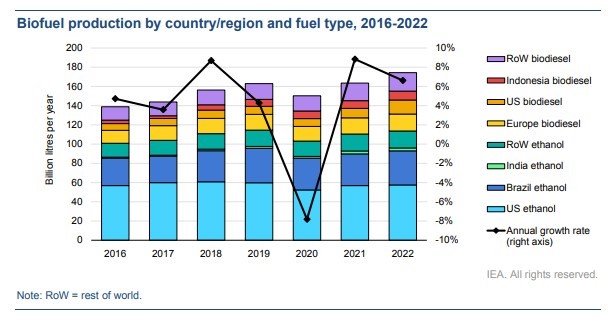One of the key takeaways from the recent 2023 G20 summit held in New Delhi is the unveiling of the Global Biofuels Alliance, launched by the Indian Prime Minister, Shri. Narendra Modi in collaboration with the other two founding members, Brazil and the U.S., which account for more than half of the global biofuel production, according to the International Energy Agency. Other G20 countries that have demonstrated their support for this partnership include Argentina, Canada, Italy, and South Africa, with the World Bank, the World Economic Forum and the UN Energy for All among the international organizations that have also manifested their interest.
Given that traditional fossil fuels represent around 75% of the global total of GHG emissions, as reported by the United Nations, the need for fuels with a lower environmental impact that can ensure the added benefits of cost-effectiveness and durability are crucial. Biofuels can provide this alternative by relying on biomass feedstocks (food crops) to produce ethanol, biodiesel, and biogas, among many others. Nevertheless, to achieve net zero goals by 2050, the global supply of biofuels needs to triple before the end of the decade, which poses a challenge for the diversification of feedstocks, using waste and other crops for biofuel production.
Biofuels advance an opportunity for fossil-fuel-intensive industries that are set to experience several difficulties in their decarbonization path due to their heavy reliance on traditional fuels, which the IEA reports account for 80% of global energy consumption. The transportation market presents a clear example of an industry that can reap important benefits from this switch towards sustainable fuels. Even though most biofuels can be used in existing engines with no adaptations or only small retrofits, the focus of future developments should be set on technologies that minimize the cost and effort required for biofuel manufacturing.
On-site production and diversification of feedstock can be decisive for widespread biofuel use, ensuring low maintenance and lucrative systems that can propel this industry revamp, tackling high prices of feedstocks that are currently affecting biofuel adoption. Due to this price increase that has defined the past couple of years, the adoption of policies and regulations is key for accelerated conversions, expanding demand by 11%, according to the IEA. Furthermore, countries with available feedstocks can benefit from biofuel production, reducing import volumes by fulfilling national demand and generating revenue by exporting excess produce.
The Global Biofuels Alliance intends to capitalize on these opportunities by providing a common international platform for biofuels development, functioning as a knowledge exchange body as well as a best practices and collaborative partnership for more sustainable production, not unlike the International Solar Alliance. The alliance seeks to expand biofuel supply, given that its growth has remained constant over the years, but not widespread enough for net zero targets achievement. Several countries that are participating in the alliance already have policies in place that promote biofuels via tax advantages, investment plans or other forms of rewards and penalties. The U.S. Inflation Reduction Act of 2022, India’s National Policy on Biofuels and the Brazilian Development Bank’s Renovabio exhibit these strategies that advocate for the use of biofuels across national economies
The need for this transformation towards biofuels can also be illustrated by the economic and political implications of fossil fuel production, a concentrated and volatile market that is very vulnerable to disruption and cyclical price fluctuations. Moreover, the rising body of regulations and policies that set targets for decarbonization is urging companies to begin this operational change in order to stay compliant and avoid fines and reputational damages that can affect their sales and performance. All in all, the energetic transformation is underway, advancing several growth opportunities for businesses that are prepared to revolutionize their operations via the introduction of biofuels, reducing their environmental impact and increasing the reliability of their production.




